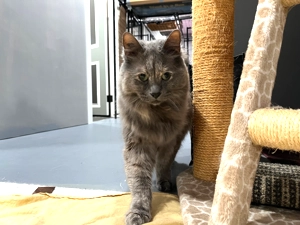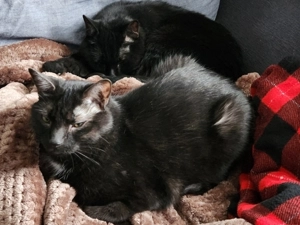Behaviour modification meds save lives
Me: “How is your kitty doing that was licking herself bald?”
Cat parent: “On Prozac and doing way better!”
Time and again, parents of cats with challenging behaviours are praising the effects of fluoxetine (aka Prozac) for making a better situation of a bad dynamic. The person who contacted me about their cat’s relentless fur chewing, and pulling, thought she had developed anxiety over a new cat in the family. This is such a common scenario, yet, not enough people know about the benefits of behaviour modification medications, like Prozac, and either ignore the condition or tolerate it to the detriment of the cat, and the whole family.
What is prozac?
Prozac is a mood disorder medication, whose generic name is fluoxitine. It is a Selective Serotonin Reuptake Inhibitor (SSRI). That’s a mouthful. Our brains love serotonin. It’s a neurotransmitter that helps us feel less anxious, less depressed, more calm and generally feeling good. Brain cells talk to each other using chemicals. Our brain cells release serotonin to talk to other brain cells. When cells are finished transmitting their signal, the serotonin is taken back up. What Prozac, and other SSRIs do, is prevent brain cells from taking serotonin back. Prozac leaves more serotonin available to mood cells to use and that means we feel better, longer.
how does prozac help cats?
Like Prozac helps humans, it also helps cats using the same actions on serotonin in the brain. Cats can experience anxiety, stress and fear. Unlike humans, cats often express these feelings in different ways than humans would. It allows cats to feel better, in general, and not get so focused on things that make them scared and anxious. Helping them realize something isn’t as bad as it seems is an uphill battle, because we can’t make them understand they’re blowing things out of proportion. We can’t ask them to calm down. Sometimes they get trapped in their head and get stuck doing something over and over. To disrupt these behaviours, we use fluoxetine, to help them focus, and work with the cat in positive ways.
peeing outside the box
One of the most common reasons for trying a cat on Prozac is inappropriate urination. While male cats are most likely to urinate in places other than the litterbox, females can do it, too. There is often a medical reason for inappropriate urination and this includes being an intact male, urinary tract infections, urinary crystals, idiopathic cystitis, kidney disease, hyperthyroidism, diabetes and other ailments.
It is unfortunate that many people jump to the conclusion that a cat is not using the litterbox because they’re trying to make the family angry to get back at them for something they did. Nothing could be further from the truth. Male cats who mark territory (vertical surfaces) either haven’t been neutered, or may have been neutered at an advanced age. Sometimes habits are hard to break. In other cases, cats pee outside the box to tell us something is wrong. It is up to us to find out what that is.
See your vet
Your vet will want to determine if your cat is suffering from any physical conditions before entertaining behaviour modification medication. They’re going to take a history from you with respect to the behaviour. Also expect to do bloodwork and a urinalysis, among other possibilities, to rule out anything physical. This is important because far more cats pee outside the box because of physical issues than psychological ones.
If your vet determines nothing physical is going on with your cat, they will usually outline steps to take to see if it is something else in their environment that’s causing the inappropriate urination. Does your cat not like their style of litterbox? Maybe they don’t like the cat litter. Is there another cat ambushing them while they’re trying to pee? Do you clean the cat litter daily? Is there something scary in their litterbox area (e.g. loud noises)?
If you have ruled out all the possible medical conditions and have addressed other issues in the home environment, it’s possible their problem is psychological. This is when trying Prozac could be appropriate. Don’t be afraid to discuss this medication with your vet. For a long time, it seemed to be a taboo subject, but because this medication keeps cats from losing their homes, veterinarians seem to be more open about prescribing it for the right situations.
As with humans, cats are individuals. Not every human reacts the same way to medications and neither do cats. For some cats, fluoxetine is ineffective. It just doesn’t do anything. For others, the response is the opposite of what is expected. In these cases, there are other medications that may work and sometimes it takes a combination of medications.
what other conditions does prozac work for?
In addition to inappropriate elimination due to psychological factors, Prozac may also work for cats who:
– are relentlessly aggressive towards other animals
– are constantly anxious and make themselves a target for attacks by other cats in their home
– obsessively overgroom and remove their fur
– attack their human caregivers
– have displaced aggression
– are painfully shy
Cats who display these behaviours need to be examined by a vet. Physical pain can cause cats to express anger and shyness. Allergies can cause overgrooming. Running to Prozac won’t help fix the problem if it’s physical. Working with your vet is the best thing you can do for your cat. With the amount of experience they have, they can give you a list of steps to take to help figure out what is going on. And in the end, if you’ve tried everything on the list to no avail, it may be time for a trial of behaviour modification medication.
Lucky and Eli were two WLCA cats who tried Prozac. Lucky became more angry while Eli became more accepting. Roll over, or tap, the images to find out what happened.


Truly a lifesaver
Prozac isn’t always forever. While they’re on medication, you’re working to help them develop new skills. If your cat has stopped displaying the concerning behaviour, they can be weaned off slowly to see if it returns. Cats who were once terrified of their housemates can relax and realize they might not be so bad after all. Housemates who used to attack them don’t get the same vibe from them and leave them alone. The longer they’re on the medication, the more practice they get being good with each other. Cats who overgroom, calm down and don’t need their coping strategy anymore. Those that mark their territory don’t feel the need to be so territorial anymore.
Although WLCA has only been around for 14 years, I’ve been doing rescue for 25. Over the years, cats have been saved because of medications that weren’t traditionally meant for them. Cats that would have otherwise been abandoned outside, or in shelters, because of unwanted behaviours, are now curled up at home instead. While Prozac is not a cure-all for every cat with a psychological condition, behaviour modification medications have really given these cats a new lease on life. Where I come from, that’s a miracle.
